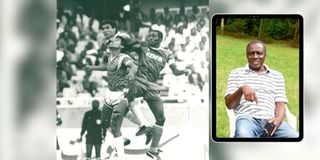
Football legend Austin Origi Oduor at a past match.
The story of Austin Oduor with Gor Mahia is one of heady success mixed with heavy discontent.
He is the only captain of the club to lift a continental title. But despite this historic feat achieved on December 5, 1987, he has nothing to show for it. Just the fame that came with achieving continental glory and honour of being considered a club legend.
Oduor, nicknamed “Makamu”, died on Tuesday after collapsing in his house in Mumias where he lived after retiring from the civil service. He was 60 years.
He joins a long list of Gor Mahia stars of the 1987 African Cup Winners’ Cup success who have gone to their graves with the disappointment of never gaining anything tangible from their momentous victory.
Oduor was also a member of the famed Origi family that has produced great footballers. He was the father to Arnold Origi, the former Harambee Stars goalkeeper. Oduor’s brother Mike Okoth, starred for Harambee Stars in the 1990s and early 2000s, featuring in the 2004 Africa Cup of Nations finals in Tunisia.
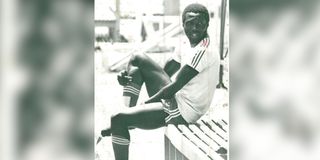
Football legend Austin Origi Oduor during a past event.
Oduor was also uncle to ex-Belgium international Divork Origi, a European Champions League winner with Liverpool. He was brother to Anthony and Gerald Origi who also had stints with Harambee Stars.
Oduor was a part of a football generation that placed Kenya on the international map. With him as leader, these crop of players of the eighties dominated East and Central Africa football with Gor Mahia and AFC Leopards winning the regional trophy at will as the national team Harambee Stars held sway.
He lifted the Cecafa Club Championship twice with Gor Mahia and Senior Challenge Cup twice with Harambee Stars.
But it is in 1987 that his name was etched in the memories of Kenyan football lovers. Oduor was captain of both club and country. In August that year, he captained Kenya to the final of the All Africa Games in Nairobi only for them to lose to Egypt by a solitary goal.
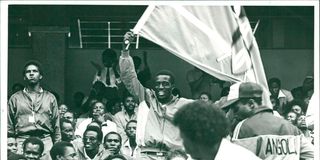
Football legend Austin Origi Oduor flies the Kenyan flag during a past match at Moi International Sports Centre, Kasarani.
Five months later, he would captain Gor Mahia to winning the Africa Cup Winners Cup aka Mandela Cup, now the Confederation Cup.
A superb passer of the ball, he started out as a midfielder for Gor Mahia before turning into the solid central defender, and arguably the best Kenya has ever produced.
Oduor is best remembered for taking the last penalty against Malawi during the famous semi-final at the 4th All Africa Games in Nairobi, burying it home to send Harambee Stars to the final.
A product of Highway Secondary School in Nairobi, Oduor honed his skills at Ziwani estate, home of Koth Biro football tournament.
According to an article in the Kenya Yearbook, Oduor made the school team while in Form One, first warming the bench before becoming a regular in Form Two.
Meanwhile, he entrenched his place in the junior Umeme team that acted as a feeder side to Kenya’s big clubs Gor Mahia, Luo Union and Kenya Breweries.
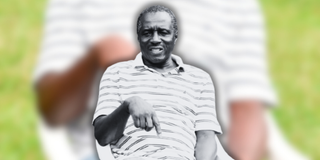
Football legend Austin Origi Oduor during an interview at Makunga village in Kakamega county on April 16, 2023.
Oduor would sign for Luo Stars in 1977 before joining Gor Mahia two years later. Here he found great players among them Dan Odhiambo, John “Bobby” Ogolla, Mike Ogolla “Machine”, Allan Thigo, George Yoga and Jerry Imbo.
But for long periods, he stayed on the bench, only occasionally getting a place when the first choice players were unavailable. It was for this reason that he was nicknamed “Makamu”, Swahili for deputy.
In his first season with the team, he won an East and Central Africa Club Championship as they beat arch rivals AFC Leopards in an all-Kenya final played in Malawi. He was not given play time but showed patience and respect for the stars of the time.
He inevitably broke into the first team when Gor Mahia faced off with Nigeria’s Bendel Insurance in an African Cup of Champions Clubs match-up. True to their reputation as a good away team, Gor beat Bendel 2-1 in Benin with Oduor scoring one of the goals.
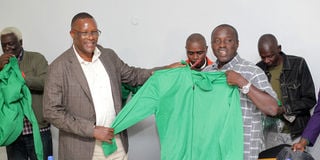
Gor Mahia legend Austin "Makamu" Odour (right) receives track suits from Information Communication Technology (ICT) Cabinet Secretary Eliud Owalo at Methodist Resort Centre in Nairobi on May 12, 2023.
Bendel defeated Gor Mahia in the return leg by a solitary goal. The unexpected loss led to several senior players, among them Allan Thigo and Andrew Obunga, to be handed indefinite suspensions. This was a godsend to the 20-year-old Oduor as his place in the team was now firmly established.
Through discipline and hard work, Oduor would rise to become captain of the team after the 1984 suspension of key players following their troubled African Cup of Champions tie against Zamalek in Cairo.
He played a key role in Gor’s famous 1985 Cecafa Championships win over AFC Leopards in Khartoum, Sudan that unearthed new players who were formed part of the conquering 1987 side.
In their Mandela Cup campaign, Gor went all the way to the final unbeaten and after a 2-2 draw in Tunis against Esperance, hope prevailed of continental glory. But the team needed more impetus.
And so, prior to the return leg, club officials promised the players a parcel of land and a car each should they win. A task force was even set up to raise funds for the purpose.
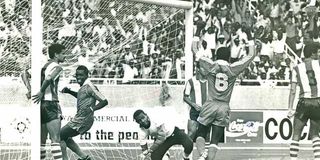
Peter Dawo is carried by his own momentum into the Esperance goal after he scored his historic goal while skipper Austin Oduor (number 6) raises his hands in jubilation.
That was motivation enough for Makamu and company. The game ended 1-1, a result that saw Gor Mahia win the Cup on the away goal rule.
According to an article in the Kenya Yearbeak, after the lap of honour, the team retreated to camp at the Moi International Sports Centre hostels. Team captain Oduor expected the officials to come and offer their congratulations and reward.
But, alas, no official showed up. The players later learnt that the officials had driven into posh clubs in the city to celebrate. It fell upon Oduor as captain to give direction. All this time, Oduor either held onto the trophy or kept a very keen eye on whoever was holding it.

Gor Mahia FC stars Austin Oduor (captain, centre) and Sammy Onyango “Jogoo” present President Daniel Arap Moi with trophies that the club won in the 1987 season. PHOTO | FILE |
After dinner, he approached the hostel management and requested them to give the players two crates of beer and two crates of soda to celebrate. Oduor, a teetotaller all his life, did not touch the frothy stuff.
The camp broke unofficially with most players going to town to celebrate in their own way.
Early the following morning, with the Mandela Cup still in his hands, Oduor took the team bus home to Zimmerman where he lived. It is while there that the first signs of post victory depression hit him.
The following day, Amos Nandi, the Team Manager, caught up with the players to hand them 14 days’ allowance totalling Sh2,100 per person.
No reward came, and no task force member could be found. In fact, the players never heard of them again. There was no accounting of the money that had been collected on behalf of the players as reward.
At least a group of fans calling themselves Kofoda raised Sh40,000 that they gifted the players. The reward came to Sh1,600 for each member of the 25-strong squad. Oduor retired as a Gor Mahia player in 1991.
In a previous interview with this writer, Oduor confessed his disappointment with the way the team was treated by its officials despite their historical success.
“It was an empty success. Look at all the players in that team and tell me who feels proud, none,” he said.









